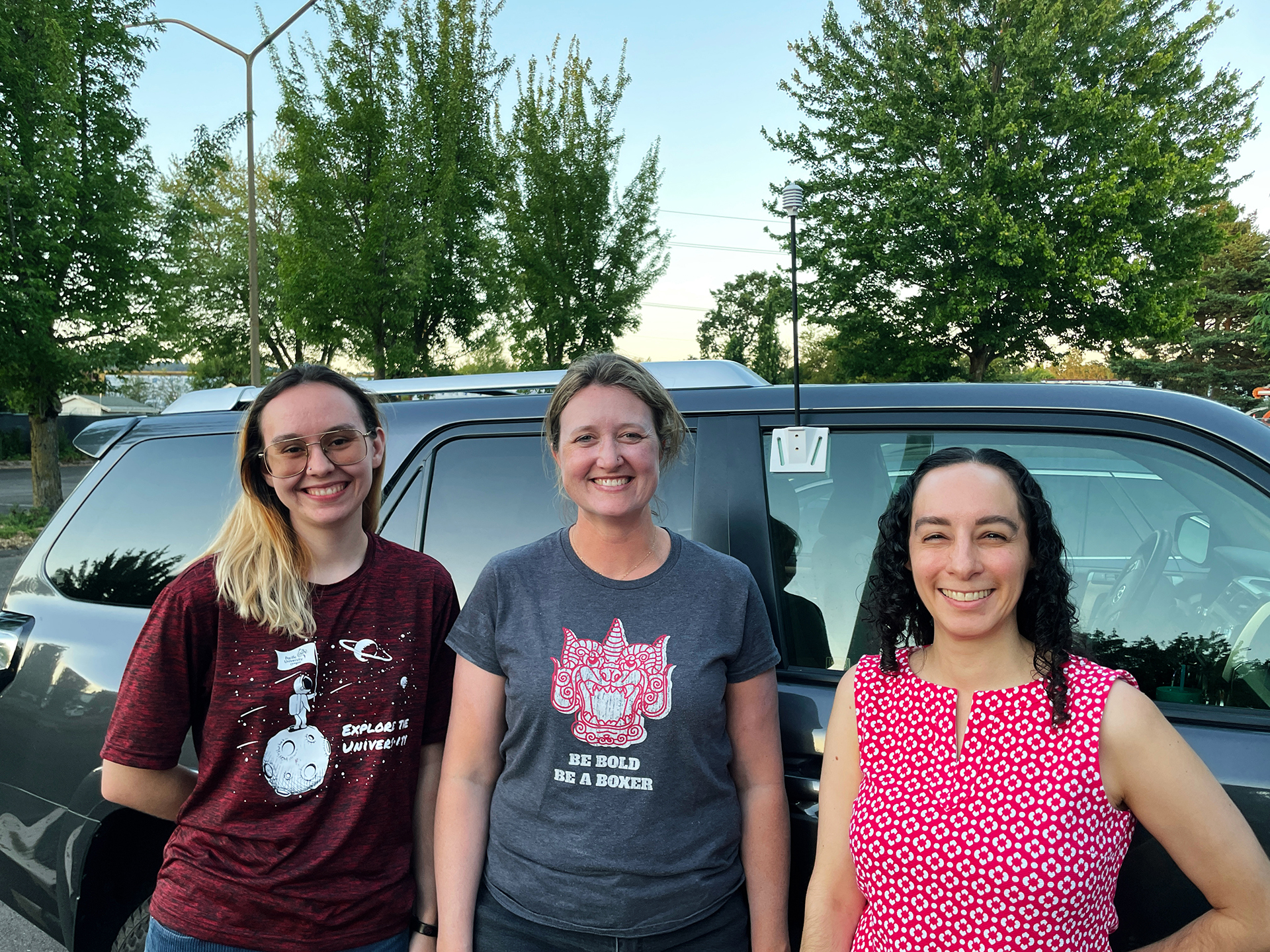 Pacific University Public Health students Kylie Hepler ’25 and Grayson Carroll ’24 joined more than 100 street scientists on a hot Saturday in July, driving around neighborhoods to collect temperature data.
Pacific University Public Health students Kylie Hepler ’25 and Grayson Carroll ’24 joined more than 100 street scientists on a hot Saturday in July, driving around neighborhoods to collect temperature data.
The data will be used to create a map of hot zones in the Portland-metro region, allowing local governments to identify unprotected neighborhoods, referred to as urban heat islands, with the goal of being better prepared for increasing summer heat waves.
Scorching summer temperatures are on the rise. In 2021, Portland’s summer heat dome led to at least 69 deaths. Globally, the World Health Organization reports a staggering 166,000 heat-related deaths between 1998-2017.
Pacific University students, faculty and alumni joined the tri-county heat mapping effort in collaboration with the National Oceanic and Atmospheric Administration (NOAA), which tracks weather-related deaths and other data in preparation for climate change.
“This project is important because extreme heat is the deadliest weather event. It kills more Americans than any other type of weather,” Carroll said.
“And a lot of people don’t realize how dangerous extreme temperatures can be.”
Hepler became interested in the project after noticing how much hotter her teenage sons felt after playing lacrosse on an artificial turf.
“It got me thinking about how much gear they have on and their safety while playing on a hot day,” she said.
“I took photos with a thermal camera on a 99-degree day during a lacrosse tournament in Bend, and the surface temperature was 165 degrees.”

Heat Mapping
Here’s how the street scientists collected data:
Volunteers picked up a sensor from the organizers of the project and attached it to their car’s passenger window. Then, they drove in pairs collecting temperature and humidity readings. Teams drove the exact same route for about an hour at 6 a.m., 3 p.m. and 7 p.m. The route included residential and commercial neighborhoods.
Once the data is analyzed and heat maps are created, local governments can get public feedback on what type of solutions communities would like to see in their areas. Solutions specific to each neighborhood can range from adding bus shelters and planting more trees to less pavement or pavement with heat-reflecting qualities.
Public education is another central goal of the heat mapping project. Heat is a silent killer, magnifying a person’s existing health conditions and increasing the risk of a heart attack, especially among the elderly and babies.
The rise in heat-related deaths has also shined a light on the inequity of living conditions among the vulnerable — unhoused people, the poor and undocumented farm workers. Low-income communities tend to be situated in areas with fewer green spaces and more heat absorbing pavement.
“I would like to see energy bill assistance for community members, who have a heavier burden to run air conditioning, because they live in a heat island,” said Pacific Public Health Professor Adelle Monteblanco, who has studied extreme heat and its effects on vulnerable populations.
“If we could offer energy bill assistance, that would be amazing.”

Social Sciences Grant
Pacific University’s participation in the NOAA heat mapping project is due in part to the Dr. Anna Leon-Guerrero ’83 Social Sciences Faculty Development Award.
The award enabled Monteblanco to hire students Carroll and Hepler, and to create the Urban Heat and Human Health Fellows. Monteblanco, who teaches environmental health, says the fellowship has given Carroll and Hepler the opportunity further explore the topics of vulnerability, capacity and urban planning, which they’ll present in the fall at Pacific’s Undergraduate Research Conference.
“They’re digging deeper into the public health literature and writing and reflecting on what they’re learning,” she said.
“They’re learning about data collection and how to help get public health messages out to the wider community by talking with the media.”
Pacific University offers a bachelor of arts and a bachelor of science in public health. The study of public health is dedicated to understanding and improving the health and well-being of all people. Pacific's public health program integrates health science, social science and humanistic approaches to addressing global health challenges.